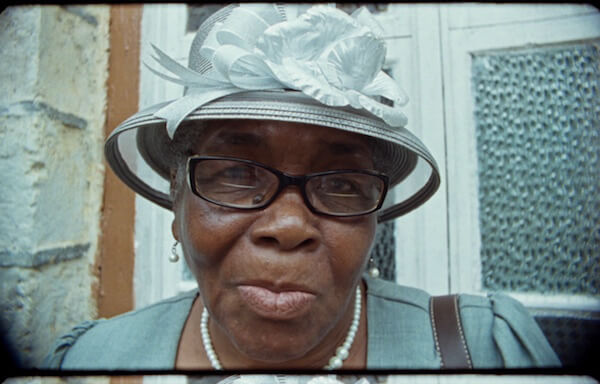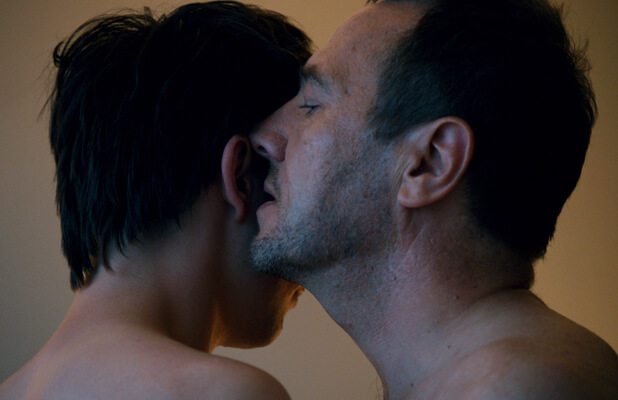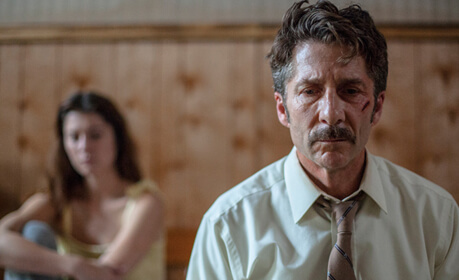Said Mrini, as young Abdellah, and Amine Ennaji, as his brother, Slimane, in Abdellah Taïa’s “Salvation Army.” | STRAND RELEASING
Abdellah Taïa, the celebrated out gay Moroccan writer, has adapted his autobiographical novel “Salvation Army” for the screen, and the result is remarkable. The film features a rare gay Arab protagonist, and Taïa proves himself as lyrical a filmmaker as he is a writer.
This intimate, episodic coming-of-age story is told in two parts. The first, longer section has young Abdellah (Said Mrini) living with his family in Morocco. He is secretly attracted to his handsome older brother, Slimane (Amine Ennaji), and lies in his brother’s bed, breathing into the pillow as if to capture Slimane’s essence. His mother (Malika El Hamaoui) chastises him for entering Slimane’s room, almost as if she knows about his obsession. His infatuation provides a symbolic expression of his own burgeoning but repressed homosexuality. Taïa is attuned to capturing these moments so they reveal the complexity of Abdellah’s hidden sexuality and identity; they are never lewd or vulgar moments.
Young Abdellah himself exudes a sexual magnetism, and it bewitches several older men in the town. He is stopped on the street by a man and taken to a construction site for sex. At the market, a fruit vendor caresses Abdellah’s hand and head, sending him off with a watermelon afterwards. Abdellah instinctively understands that men desire him — and that he is attracted to men — but he cannot articulate this reality. He does, however, acknowledge that sex is a means for getting something else. Taïa presents these encounters with subtlety, letting them silently inform the protagonist’s experiences, actions, and outlook.
Abdellah Taïa’s adaptation of autobiographical novel charts journey to uncertain European adulthood
The young Abdellah is not without shame about his sexuality. He is teased one night by his sister for wanting to eat with the women in the family. His relationship with his father (Abdelhak Swilah) is more complicated, and the issue of his son’s sexuality is not discussed.
Taïa takes pains to depict Abdellah’s conflicted emotions, but his narrative approach also forces viewers to draw inferences. When Abdelleh pulls off a flower’s petals, playing “He loves me, he loves me not,” the object of his desire is ambiguous. He is probably thinking about his brother, and not the stranger he recently had sex with or his father.
The film also shows how Abdellah’s formative years are shaped by the larger family dynamics. A painful scene has Abdellah’s father abusing his mother, and the family rallies to her defense. This moment, along with a scene where Abdellah reacts to a stranger’s threat on the street by shouting “I’m not afraid of you,” demonstrate his toughening up. He matures further when Slimane takes him and his much younger brother to the beach for a vacation. The trip proves a pivotal moment in his life.
At their hotel, Abdellah pretends to be sleeping as he spies on his naked brother drying off after a shower. When Slimane talks with Abdellah about the importance of learning French and leaving Morocco, Abdellah is torn. But in the film’s second part, we see him taking his brother’s advice. A critical episode when Abdellah has a sexual assignation with a stranger signals he is finally accepting his homosexuality.
Taïa captures Abdellah’s longing beautifully, poignantly, and even painfully. These encounters are shot — as is most of “Salvation Army” — with a minimalism that draws viewers in, even if the drama can at times feel detached. But there is something hypnotic about Taïa’s filmmaking here; it is always full of emotion, even when the characters are a bit aloof. A scene in a hammam is exquisitely sensual as an older man washes the mud off Abdullah’s body. Lingering shots emphasize the story’s competing themes of purification and eroticism.
“Salvation Army” jumps ahead 10 years for its second part, and here the adult Abdellah (Karim Ait M’Hand, a great physical match for Mrini) is initially involved with Jean (Frédéric Landenberg), an older Swiss professor. Their relationship, however, is yet another exchange of sex for something else. We next see Abdellah in Geneva with a student visa, searching for a place to live while he waits to start school. As he wanders the city and washes himself in a public bathroom sink, his despair is palpable. When he finally arrives at the Salvation Army, the ending is deliberately open-ended.
Taïa’s impressionistic film does not build to a dramatic climax, but each scene creates a distinctive feeling. Abdellah has a wide variety of encounters with strangers in his life, and moments from his childhood are reflected and refracted in his adult experiences. Audiences who embrace the filmmaker’s oblique storytelling technique will make connections and draw parallels. Taïa, whose book fleshes out his story more completely, has adapted it into a subtle film with less explication but no less power.
SALVATION ARMY | Directed by Abdellah Taïa | Strand Releasing | In French and Arabic, with English subtitles | Opens Jan. 23; one week only | Film Society of Lincoln Center, Elinor Bunin Munroe Film Center, 144 W. 65th St. | filmlinc.com



































